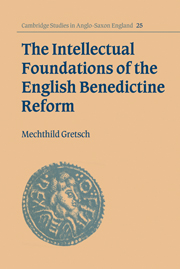Book contents
- Frontmatter
- Contents
- Preface
- List of abbreviations
- 1 Introduction
- 2 Psalters and psalter glosses in Anglo-Saxon England
- 3 The vocabulary of the Royal Psalter
- 4 The Royal Psalter and the Rule: lexical and stylistic links
- 5 The Aldhelm glosses
- 6 Word usage in the Royal Psalter, the Rule and the Aldhelm glosses
- 7 Æthelwold and the Old English Rule
- 8 Æthelwold and the Royal Psalter
- 9 Æthelwold and the Aldhelm glosses
- 10 French and German loan influence
- 11 Conclusion
- Appendix I Æthelwold's life and career
- Appendix II The Royal Psalter at Canterbury
- Appendix III The Gernrode fragments of an Old Saxon psalm commentary
- Bibliography
- Index of Old English words
- Index of Latin words
- General index
3 - The vocabulary of the Royal Psalter
Published online by Cambridge University Press: 01 October 2009
- Frontmatter
- Contents
- Preface
- List of abbreviations
- 1 Introduction
- 2 Psalters and psalter glosses in Anglo-Saxon England
- 3 The vocabulary of the Royal Psalter
- 4 The Royal Psalter and the Rule: lexical and stylistic links
- 5 The Aldhelm glosses
- 6 Word usage in the Royal Psalter, the Rule and the Aldhelm glosses
- 7 Æthelwold and the Old English Rule
- 8 Æthelwold and the Royal Psalter
- 9 Æthelwold and the Aldhelm glosses
- 10 French and German loan influence
- 11 Conclusion
- Appendix I Æthelwold's life and career
- Appendix II The Royal Psalter at Canterbury
- Appendix III The Gernrode fragments of an Old Saxon psalm commentary
- Bibliography
- Index of Old English words
- Index of Latin words
- General index
Summary
The remarkable richness and variety of the Royal Psalter's vocabulary and the unusual character of part of that vocabulary have been noted ever since Fritz Roeder's edition of its text became available for scholarly study. As Kenneth Sisam has aptly put it: ‘The original glossator was a man of considerable learning. His vocabulary is rich and varied; and if allowance is made for the difficulty of the language of the psalms, he makes few gross errors’. When referring to the Royal Psalter's vocabulary, scholars have regularly pointed out two salient features of the gloss: first, the fact that its glossator is much inclined to use a variety of Old English interpretamenta for a given Latin lemma (an inclination which, for example, is utterly distinct from that of the glossator of the Vespasian Psalter) and, second, the Glossator's extraordinary penchant for choosing rare words, many of which are not recorded outside the Royal Psalter (or attested in directly dependent glosses only), and no doubt many of which were coined by the Glossator himself. A substantial number of these unusual words belong to the register of poetry. It is interesting to remark that these extravagant idiosyncrasies of the Glossator often are not adopted by the other D-type psalters, which tend to choose a more common gloss word instead of one of the Glossator's rarities and to cut down his exuberant lexical variation with the aim of producing (again) a stable relationship between Latin lemma and Old English interpretamentum.
- Type
- Chapter
- Information
- Publisher: Cambridge University PressPrint publication year: 1999

